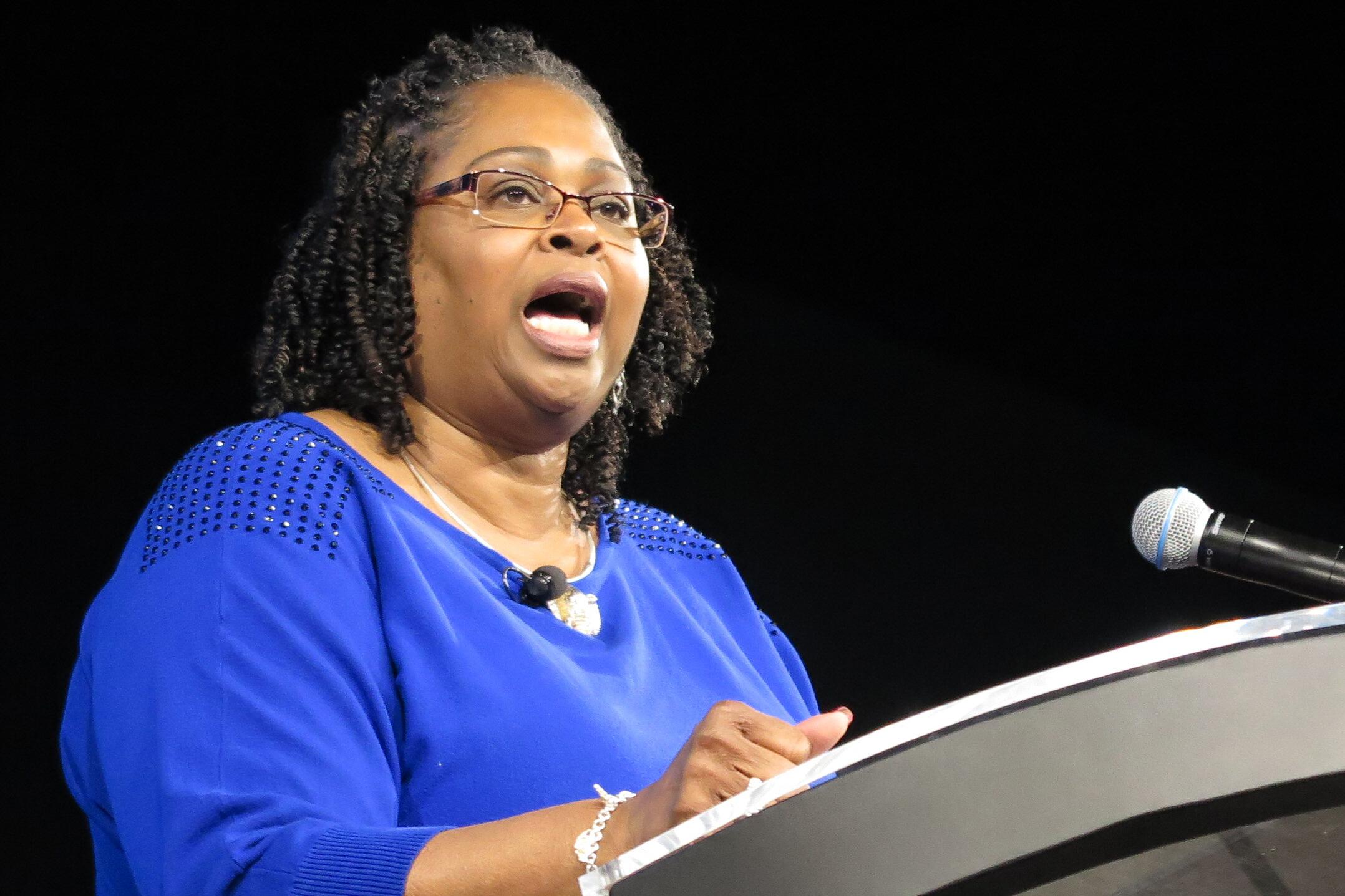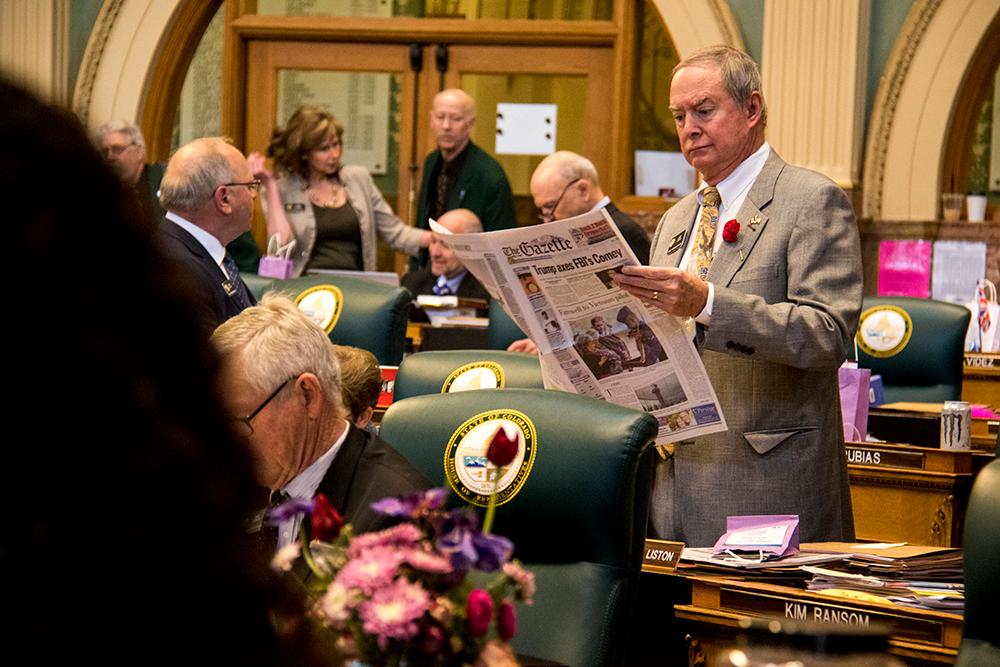
Republican leadership in El Paso County is in conflict over a proposed rule change that some say could allow the county’s controversial chair to “purge” her critics from the party.
It’s the latest sign of ongoing divisions that have wracked the GOP organization in the state’s largest Republican-controlled county, even as the state party hopes to make gains in Colorado in the 2022 election.
The sweeping proposal would create a process for the El Paso County GOP’s chair to remove someone from the party organization for “malfeasance or misfeasance” or for a “violation of the National and State Party platform[s]”. That punishment could extend to sitting elected officials. The language is slated to be voted on early next month.
If approved, chair Vickie Tonkins would only need 25 signatures from other party members in order to appoint a five-person panel to determine if the individual should be barred from the Republican Party for four years. A two-thirds vote at an El Paso County central meeting would be required to finalize the decision.
“A successful vote to censure and remove is immediate, final, and unappealable,” states the proposed change. “Upon removal from the Republican party of El Paso County, the individual shall relinquish all official titles and seats held in the party.”
The rule change would also require the party to try to get the person’s Republican affiliation revoked through the El Paso county clerk’s office. However, county clerk Chuck Broerman said his office can’t change a voter’s party affiliation unless that person requests it, describing the idea as a potential voting rights issue, and a violation of the constitution’s protection of people’s right to join the political party of their choice.
“Where is a clerk and recorder’s authority to unilaterally remove someone’s affiliation? Where can they point to in law that I have that authority?” said Broerman, a Republican.
State Sen. Larry Liston of Colorado Springs said he thinks the whole rule change is a way for Tonkins to go after Republicans she has a vendetta against.
“I'm not up for election, but I'm sure that Ms. Tonkins would like to get rid of me. I have no doubts about it,” said Liston.

Liston is one of many elected El Paso County Republicans who have been publicly at odds with Tonkins in recent years. She was urged to resign over a social media post that questioned whether the COVID-19 pandemic is a “psych-op.” Local leaders also tried to strip her of financial control of party funds and have criticized her ties to a local group that describes itself as a “constitutional militia.”
However, local party members involved in changing the bylaws strongly defend the proposed policy.
“The proposed rule came about after much thoughtful and lengthy consideration by the whole committee and was approved unanimously,” said Jeremy Goodall, chairman of the El Paso GOP Bylaws Committee in an email response to reporters’ questions. “To me, personally, it would seem a self-evident matter that persons seeking to promote themselves to the general public as Republicans would, and should rightly be, held accountable by other Republicans to the precepts and platform of the Republican Party.”
Goodall said the purpose of the change is to extend accountability measures that are already in place for precinct leaders and party officers to more of the people involved in running the county party. And he called it ‘illuminating and informative’ that Liston would assume he would be personally targeted.
The Colorado Republican Party said it was aware of the proposed bylaws changes in El Paso County and said the state party’s attorney is currently reviewing them.
“We support the right of every registered Republican to participate in our Party. This is not something we will be responding to via the media,” said CO GOP Executive Director Joe Jackson in a text message.
Members of the El Paso County GOP’s central committee, which includes elected officials and local party leaders, are scheduled to vote on the proposed rule change on February 5th.
“It disenfranchises Republican voters. It’s contrary to our constitution and it smacks of fascism. And in my opinion it’s absolutely illegal on many levels,” said Karl Schneider, who currently serves as vice-chair of the county party.
Schneider has launched a separate campaign finance complaint against Tonkins, related to a fundraiser she hosted with Georgia Congresswoman Marjorie Taylor Greene. The state moved it forward and a lawsuit is currently making its way through the state Attorney General’s office.
Schneider said if this rule change went into effect, it might purge the party of people who Tonkins and her supporters deemed “unclean” or “impure”, including those who doesn’t agree with party platform positions on anything from undocumented immigrants to gay marriage.
“If you give an inch to this type of fascist, extremist right wing ideology, if we don’t address it at every step of the way, it’s going to get a hold. And if it gets a foothold, it’s broader and more insidious,” said Schneider.
The controversy over the bylaws change comes at a time when many Republican strategists believe the focus should be on expanding the party, in the hope of building momentum for what’s expected to be a favorable midterm election.
“This is the kind of thing that makes the Republican party look like a clown show,” said political consultant and former state party Chair Dick Wadhams. ”This is the ultimate party insider power play: anyone who disagrees with me and my interpretation of what being a Republican is all about must be excluded, destroyed, and must be eliminated from the party.”
Wadhams fears intraparty fights like this could hurt the party’s ability to broaden its base and reach out to the unaffiliated voters who are now the state’s largest voting block.
Related stories
- Colorado wants to give out free KN95 masks at your local library. But maybe call ahead first to see if they have them
- Polis pushes back on Democrats’ plan for broad new public worker union rights
- Colorado Democrats consider ‘rent stabilization’ for mobile home parks
- Interview: Gov. Jared Polis on omicron, climate change and helping the survivors of the Marshall fire









